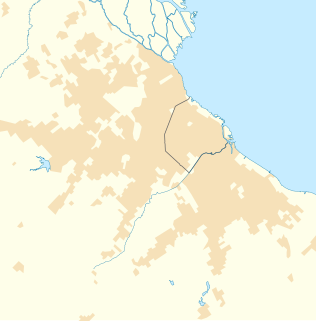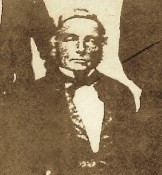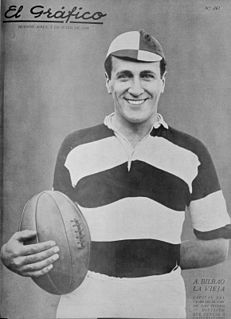
Juan de Garay (1528–1583) was a Spanish conquistador. Garay's birthplace is disputed. Some say it was in the Castile city of Junta de Villalba de Losa, while others argue he was born in the area of Orduña. There's no birth certification whatsoever, though Juan De Garay regarded himself as somebody from Biscay. He served under the Crown of Castille, in the Viceroyalty of Peru. He was governor of Asunción and founded a number of cities in present-day Argentina, many near the Paraná River area, including the second foundation of Buenos Aires, in 1580.
Basque Argentines are Argentine citizens of Basque descent or people from Basque residing in Argentina. Basque Argentines are one of the largest Basque diaspora groups in the world.

Llavallol is a district of Lomas de Zamora Partido in Buenos Aires Province, Argentina. It forms part of the Greater Buenos Aires urban conurbation.

Miguel Gerónimo de Esparza (1678–1767) was a Spanish nobleman, who served during the Viceroyalty of Peru as Attorney and Regidor of Buenos Aires. He also served as Captain of the Militias and acting Mayor of Buenos Aires for several periods.
Juan Miguel de Esparza (1712–1766) was a Spanish merchant, military man and politician. He held honorary positions during the Viceroyalty of Peru serving as Alcalde, Regidor and Alférez real of Buenos Aires.
Juan José Canaveris (1780–1837) was an Argentine jurist and politician, who served as military man, lawyer, notary, prosecutor and accountant of Buenos Aires. In 1809 he was honored by the Junta Suprema de Sevilla, for his heroic participation in the defense of Buenos Aires, during the English invasions in the Río de la Plata.

Alejo de Esparza was a Basque soldier and merchant, who served as Commander of the Fort of Buenos Aires and colonizer of the city in the 17th century. He was founder of the Esparza family in the Río de la Plata, whose paternal branch was extinguished in the eighteenth century, His sons, Joseph de Esparza and Miguel Gerónimo de Esparza were distinguished members of government during the Viceroyalty of Peru.
Francisco Pelliza (1792-1879) was an Argentine military, patriot officer who fought in the Argentine War of Independence.

Basque centers are associative organizations that appeared in the end of the 19th century in cities that have really an important presence of Basque emigration, with the purpose of helping each other and keeping links with Basque culture and homeland. They are also meeting points for the Basque people who live all around the world far away from their land.

Amador Báez de Alpoim (1602-1652) was a Spanish army officer and politician, who served during the Viceroyalty of Peru as alcalde of Buenos Aires and Lieutenant Governor of Corrientes and Santa Fe (Argentina).

Juan Báez de Alpoim (1643–1716) was a Spanish army officer and politician. He holds various government positions during the Viceroyalty of Peru, serving as alcalde and regidor of Buenos Aires.
Bartolomé Ramírez (15-16?) was a Spanish Military, was one of the neighbors of Buenos Aires, who were commissioned to make a request to the king of Spain about the desperate state of the settlers.
Héctor Canavery (1854–1900s) was an Argentine politician and military. He was commissary in the district of Quilmes, and also served as Lieutenant in the Argentine Army, taking part in expeditions against the Indians during the Conquest of the Desert.
Juan de Cáceres y Ulloa (1618–1682) was a Spanish nobleman and musician, who served as organist of Buenos Aires Metropolitan Cathedral. He was the first musician of the Río de la Plata, together with Juan Vizcaíno de Agüero.

Joseph Thwaites was an English trader who served as delegate in The British Commercial Rooms of Buenos Aires. He belonged to the group of British merchants, who had done business in Buenos Aires and Montevideo, between 1810 and 1830.
Antonio Thomas was a Portuguese marine, conquistador in service of the Spanish crown. He had attended the two foundations of Buenos Aires.

Antonio Bilbao La Vieja (1892–1980) was an Argentine architect and rugby union footballer. He spent his whole sports career at San Isidro. And was the coach of the Argentina national team in 1927.
Garay or de Garay is a surname. Notable people with the name include:
Miguel Antonio Cuyar (c.1780-1840s) was an Asturian merchant and politician. He served in the militia of Buenos Aires, during the English Invasions, being assigned as Captain in the 7th Company of Asturians.
Carlos María "Rhod" Rothfuss was a Uruguayan-Argentine artist who specialized in painting and sculpture. He was considered a key theoretician for the development of the concrete art movement in Argentina in the 1940s and was a founding member of the international Latin American abstract art movement, Grupo Madí.










